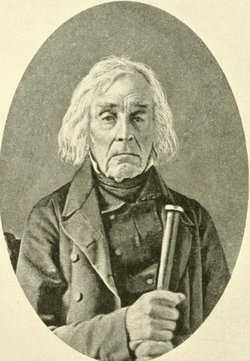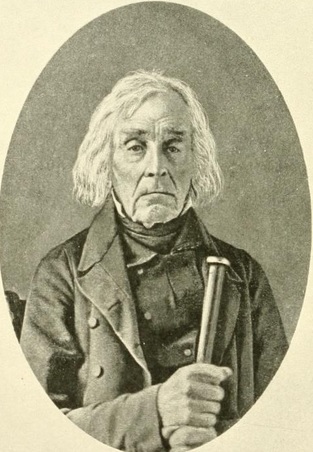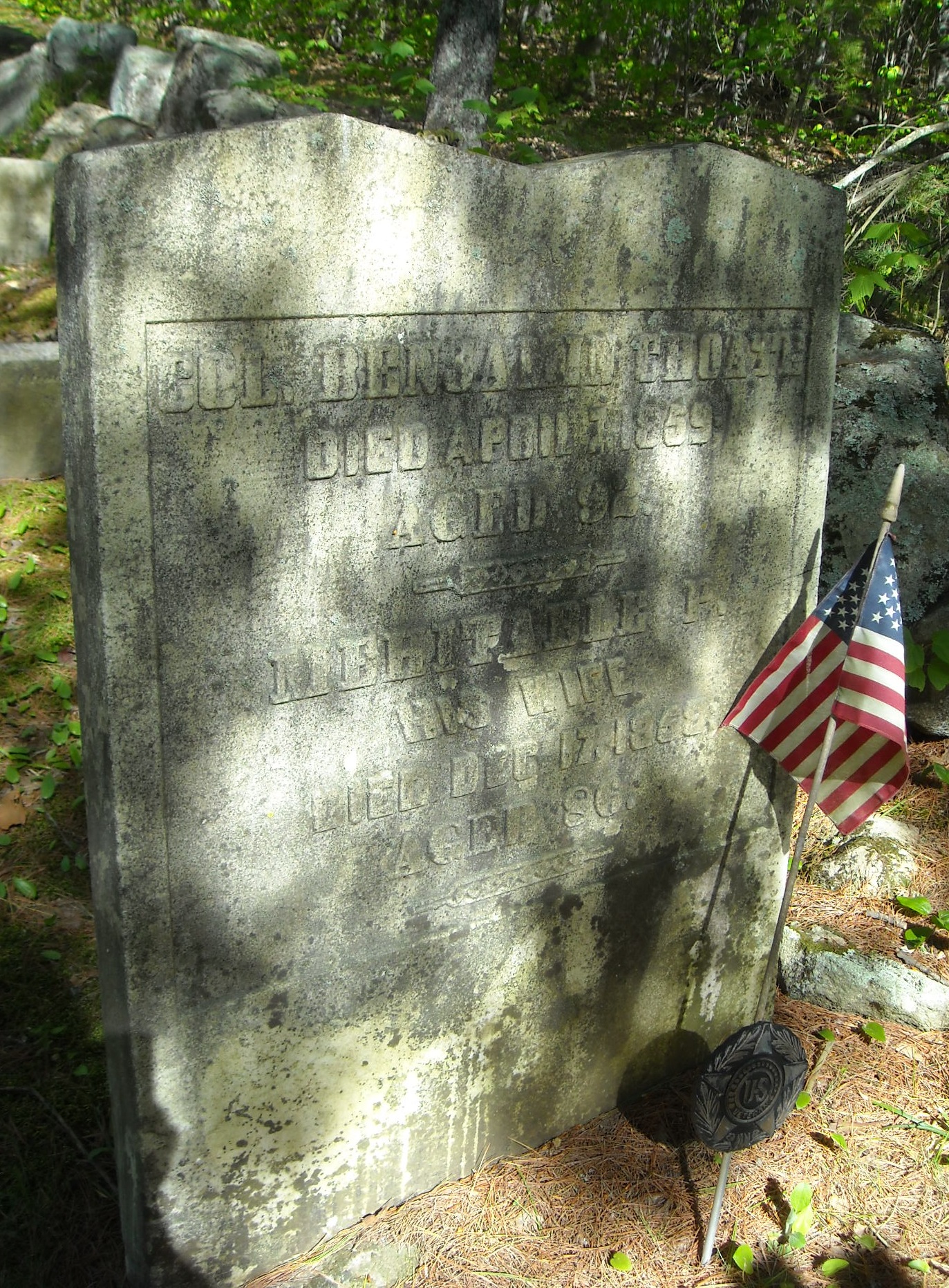m Mehitable Plumer on Nov. 20. 1793
Children:
- Nathan Choate (19 Nov 1794-1834) m Susan Carter
- Samuel Choate (9 Mar 1797-12 Mar 1882) m Anner Choate
- Thomas Choate (5 Jul 1799-10 May 1876) Maria Choate
- Mehitable Choate (20 Jun 1802-21 Apr 1863) m George W Fifield
- Benjamin Choate (25 Jan 1806-7 Sep 1875) m Eliza Ann Whittmore
- Betsey Choate (10 Nov 1808-2 Jul 1855) m Luther Howe
- George Washington Choate (21 Dec 1811-23 Mar 1863) m Sarah A Gerrish
- Mary Jane Choate (5 May 1815-4 Aug 1850) m Nathaniel Howe
Mr. Choate in his early manhood went from his Island home with his parents and younger brother in 1788 to Boscawen, N.H. Before leaving Chebacco, he had learned the blacksmith's trade of his older brother, Thomas Choate.
He was twenty-seven years old when he married the young lady, who it is said was charming in person and lovely in character. And soon after they removed still further into the country, and settled in Enfield, N.H., where Mr. Choate owned a large tract of land on what is known as "George Hill." As years went on he became a thriving farmer, having many wide acres under the best of cultivation.
He kept a large stock of cattle, sheep, and horses; had barns, wood and carriage houses, all in keeping with his extensive farming operations. He had also shops for blacksmithing, for the manufacture and repairs of tools, carts, sleds, and all sorts of mechanical work necessary in carrying on the farm, these various buildings presenting
quite a village-like appearance.
Mr. and Mrs. Choate betrayed of what stock they were by their spirit and fidelity in all the religious ways of the Puritans. For years they were accustomed to go on horseback six miles to attend church in Springfield, N.H. Their children, as they grew older, often walked the entire distance. His family all became members of the Congregational Church. And when at length a church was organized in Enfield, the town in which they lived, it was constituted quite largely of Colonel Choate and his family.
He was a man of commanding personal appearance, above the medium height, and well proportioned; of a muscular and robust build, but not corpulent; had a high and massive forehead. and a deep chest tone of voice, low in common conversation, but, when used with its full force, stentorian in its power, and having that peculiar quality of being distinctly heard at long distances, even when it did not seem loud to those immediately about him. Like many of the Choates of that time, he had great decision of character and a strong will, though always kept in perfect control by a sound judgment and the precepts of religion. He was grave and dignified in demeanor, had a fine presence, and, as has been said of another, "his very presence in an assembly
seemed a call to order." He had an accurate judgment, was quick of apprehension, possessed a good memory and had he enjoyed the benefits of a liberal education could not have failed to have been found among the most eminent of the land. Even in old age his reasoning was clear and logical, and his language choice.
Mr. Choate was a Justice of the Peace and Colonel of militia at a time when the war with England of 1812 caused the people to take great pride and interest in military matters, and the Militia Muster, or general training in the fall, and the March Meeting, or town election in the spring, divided honors with Fourth of July and Thanksgiving as holidays, at which all, great and small, rich and poor, met to show their patriotism, celebrate the day, eat gingerbread, and have a social, and sometimes hilarious visit with friends and neighbors.
It was on one of these occasions, probably town meeting, that an incident occurred which shows the power which Colonel Choate's commanding presence and powerful voice had over a boisterous and unruly crowd. A number of the rougher sort, who had probably taken a fancy to their gingerbread with too much New England rum became very loud in their discussions, and commenced to use arguments more muscular
than intellectual, when another Justice of the Peace, a man of small stature with an effeminate soprano voice, commenced to hop around among them, trying to quell the riot, crying out in his thin wiry voice, "Don't fight, boys, don't fight! don't fight!! don't fight!" But they fought all the more, answering his well-meant efforts with jeers and shouts of derision. At this time Colonel Choate appeared on the scene of action, and vociferated in tones like distant thunder. "I command you in the name of the State of New Hampshire to disperse!" Immediately all was still as death, such awe and terror even did his voice and character inspire in evil-doers. Ever afterward "Don't fight, don't fight." was a by-word with "the boys."
Another story is told of the power of his voice which is more difficult of belief, though the person who told it insisted it was literally true. He said that being himself
on East Hill, in Enfield, one general training day, he distinctly heard the Colonel give the word of command while drilling his regiment on Canaan Street, fully five miles
distant. Whether true or not, it shows the prevailing opinion of the Colonel's vocal powers. Yet he was one of the coolest and most even tempered of men, seldom showing any irritation, and never giving others any just cause for any. He very rarely punished any of his children, the simple word "boys," uttered in his peculiar tone, being generally sufficient to subdue any rebellious or turbulent spirit among them. I have heard his son Samuel say that he never struck him but one blow, and that, as it proved, without cause. Some tool or implement could not be found, and each boy denied any knowledge of it, when he gave each a single blow, probably not very heavy and doubtless soon repented of, for I think he found the article had been mislaid, and
the boys were not to blame.
Source:
- Fragments of a Family Record: Col. Benjamin Choate, Mehitable Plumer Choate and Certain of Their Descendants; Supplementing the Choates in America (1643-1896) by E.O. Jameson
- The Choates in America. 1643-1896 by E.O. Jameson (1896)
m Mehitable Plumer on Nov. 20. 1793
Children:
- Nathan Choate (19 Nov 1794-1834) m Susan Carter
- Samuel Choate (9 Mar 1797-12 Mar 1882) m Anner Choate
- Thomas Choate (5 Jul 1799-10 May 1876) Maria Choate
- Mehitable Choate (20 Jun 1802-21 Apr 1863) m George W Fifield
- Benjamin Choate (25 Jan 1806-7 Sep 1875) m Eliza Ann Whittmore
- Betsey Choate (10 Nov 1808-2 Jul 1855) m Luther Howe
- George Washington Choate (21 Dec 1811-23 Mar 1863) m Sarah A Gerrish
- Mary Jane Choate (5 May 1815-4 Aug 1850) m Nathaniel Howe
Mr. Choate in his early manhood went from his Island home with his parents and younger brother in 1788 to Boscawen, N.H. Before leaving Chebacco, he had learned the blacksmith's trade of his older brother, Thomas Choate.
He was twenty-seven years old when he married the young lady, who it is said was charming in person and lovely in character. And soon after they removed still further into the country, and settled in Enfield, N.H., where Mr. Choate owned a large tract of land on what is known as "George Hill." As years went on he became a thriving farmer, having many wide acres under the best of cultivation.
He kept a large stock of cattle, sheep, and horses; had barns, wood and carriage houses, all in keeping with his extensive farming operations. He had also shops for blacksmithing, for the manufacture and repairs of tools, carts, sleds, and all sorts of mechanical work necessary in carrying on the farm, these various buildings presenting
quite a village-like appearance.
Mr. and Mrs. Choate betrayed of what stock they were by their spirit and fidelity in all the religious ways of the Puritans. For years they were accustomed to go on horseback six miles to attend church in Springfield, N.H. Their children, as they grew older, often walked the entire distance. His family all became members of the Congregational Church. And when at length a church was organized in Enfield, the town in which they lived, it was constituted quite largely of Colonel Choate and his family.
He was a man of commanding personal appearance, above the medium height, and well proportioned; of a muscular and robust build, but not corpulent; had a high and massive forehead. and a deep chest tone of voice, low in common conversation, but, when used with its full force, stentorian in its power, and having that peculiar quality of being distinctly heard at long distances, even when it did not seem loud to those immediately about him. Like many of the Choates of that time, he had great decision of character and a strong will, though always kept in perfect control by a sound judgment and the precepts of religion. He was grave and dignified in demeanor, had a fine presence, and, as has been said of another, "his very presence in an assembly
seemed a call to order." He had an accurate judgment, was quick of apprehension, possessed a good memory and had he enjoyed the benefits of a liberal education could not have failed to have been found among the most eminent of the land. Even in old age his reasoning was clear and logical, and his language choice.
Mr. Choate was a Justice of the Peace and Colonel of militia at a time when the war with England of 1812 caused the people to take great pride and interest in military matters, and the Militia Muster, or general training in the fall, and the March Meeting, or town election in the spring, divided honors with Fourth of July and Thanksgiving as holidays, at which all, great and small, rich and poor, met to show their patriotism, celebrate the day, eat gingerbread, and have a social, and sometimes hilarious visit with friends and neighbors.
It was on one of these occasions, probably town meeting, that an incident occurred which shows the power which Colonel Choate's commanding presence and powerful voice had over a boisterous and unruly crowd. A number of the rougher sort, who had probably taken a fancy to their gingerbread with too much New England rum became very loud in their discussions, and commenced to use arguments more muscular
than intellectual, when another Justice of the Peace, a man of small stature with an effeminate soprano voice, commenced to hop around among them, trying to quell the riot, crying out in his thin wiry voice, "Don't fight, boys, don't fight! don't fight!! don't fight!" But they fought all the more, answering his well-meant efforts with jeers and shouts of derision. At this time Colonel Choate appeared on the scene of action, and vociferated in tones like distant thunder. "I command you in the name of the State of New Hampshire to disperse!" Immediately all was still as death, such awe and terror even did his voice and character inspire in evil-doers. Ever afterward "Don't fight, don't fight." was a by-word with "the boys."
Another story is told of the power of his voice which is more difficult of belief, though the person who told it insisted it was literally true. He said that being himself
on East Hill, in Enfield, one general training day, he distinctly heard the Colonel give the word of command while drilling his regiment on Canaan Street, fully five miles
distant. Whether true or not, it shows the prevailing opinion of the Colonel's vocal powers. Yet he was one of the coolest and most even tempered of men, seldom showing any irritation, and never giving others any just cause for any. He very rarely punished any of his children, the simple word "boys," uttered in his peculiar tone, being generally sufficient to subdue any rebellious or turbulent spirit among them. I have heard his son Samuel say that he never struck him but one blow, and that, as it proved, without cause. Some tool or implement could not be found, and each boy denied any knowledge of it, when he gave each a single blow, probably not very heavy and doubtless soon repented of, for I think he found the article had been mislaid, and
the boys were not to blame.
Source:
- Fragments of a Family Record: Col. Benjamin Choate, Mehitable Plumer Choate and Certain of Their Descendants; Supplementing the Choates in America (1643-1896) by E.O. Jameson
- The Choates in America. 1643-1896 by E.O. Jameson (1896)
Family Members
Advertisement
Explore more
Sponsored by Ancestry
Advertisement













